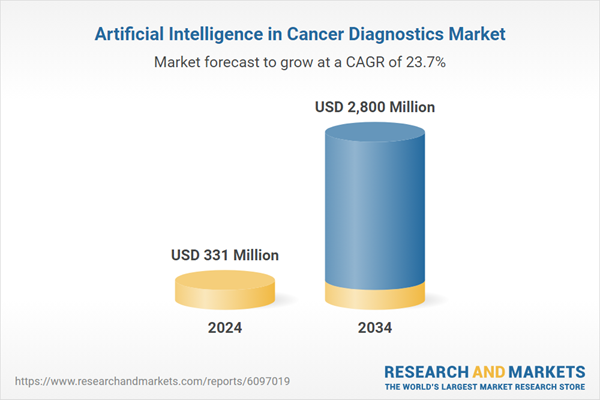AI-powered cancer diagnostic systems utilize machine learning and image recognition capabilities to identify abnormalities with higher precision. This tech-driven transformation fosters a shift toward early detection strategies and real-time monitoring essential for cancers that typically progress without symptoms. These smart diagnostic platforms support clinicians by reducing interpretation errors and boosting workflow efficiency. As a result, the implementation of AI is becoming central to next-generation cancer care, bringing value across both clinical and operational dimensions in healthcare. Hospitals, diagnostics labs, and research institutions rely on AI platforms to improve accuracy and reduce turnaround time.
In 2024, the hospital segment emerged as the leading end user in the artificial intelligence in cancer diagnostics market and is projected to reach a valuation of USD 1.5 billion by 2034. Hospitals remain at the forefront of adopting cutting-edge AI technologies that assist in the early detection and precise cancer diagnosis. These facilities increasingly rely on AI-based tools such as machine learning algorithms, digital pathology systems, and intelligent imaging platforms to streamline workflows, reduce diagnostic errors, and improve clinical decision-making. Integration of AI also helps hospitals manage large volumes of patient data while enabling faster turnaround times, ultimately enhancing patient care outcomes.
The breast cancer segment held a substantial portion of 29.4% share in 2024, attributed to the widespread incidence of breast cancer globally and the pressing demand for technologies that can detect malignancies at an early, more treatable stage. AI-powered diagnostic solutions are especially impactful in identifying subtle patterns and anomalies in mammograms, ultrasound, and MRI scans, which often go unnoticed during conventional assessments. Integrating AI in breast cancer screening not only enhances sensitivity and specificity but also supports risk stratification and personalized treatment planning. As early diagnosis remains critical in reducing
North America Artificial Intelligence in Cancer Diagnostics Market held 41.3% share in 2024, shaped by advanced healthcare infrastructure, a high volume of cancer cases, and growing demand for AI-integrated diagnostic tools. The country’s strong emphasis on medical innovation and collaborative partnerships among academic institutions, healthcare startups, and regulatory agencies has accelerated the pace of AI adoption. Rapid advances in deep learning and imaging interpretation enable clinicians to detect tumors earlier and tailor treatments more effectively, reducing costs and improving patient prognosis.
Major players operating in the artificial intelligence in cancer diagnostics industry include Tempus, Siemens Healthineers, EarlySign, Vuno, Paige AI, Flatiron, Microsoft, Cancer Center.ai, SkinVision, GE Healthcare, Kheiron Medical Technologies, Nanox Imaging, Path AI, and Therapixel.To strengthen their market position in the Global Artificial Intelligence in Cancer Diagnostics Market, companies are focusing on strategic collaborations, software innovation, and regulatory clearances. In the US and North America markets, many players invest in partnerships with hospitals and biotech firms to refine AI models using real-world clinical data. Key companies are also expanding their presence in Europe and Asia-Pacific by localizing solutions and engaging in region-specific clinical trials. Furthermore, continuous upgrades in imaging algorithms and cloud-based diagnostic platforms are helping providers scale their offerings globally while addressing evolving clinical demands.
Comprehensive Market Analysis and Forecast
- Industry trends, key growth drivers, challenges, future opportunities, and regulatory landscape
- Competitive landscape with Porter’s Five Forces and PESTEL analysis
- Market size, segmentation, and regional forecasts
- In-depth company profiles, business strategies, financial insights, and SWOT analysis
This product will be delivered within 2-4 business days.
Table of Contents
Companies Mentioned
The companies featured in this Artificial Intelligence in Cancer Diagnostics market report include:- Cancer Center.ai
- EarlySign
- Flatiron
- GE Healthcare
- Kheiron Medical Technologies
- Microsoft
- Nanox Imaging
- Paige AI
- Path AI
- Siemens Healthineers
- SkinVision
- Tempus
- Therapixel
- Vuno
Table Information
| Report Attribute | Details |
|---|---|
| No. of Pages | 135 |
| Published | May 2025 |
| Forecast Period | 2024 - 2034 |
| Estimated Market Value ( USD | $ 331 Million |
| Forecasted Market Value ( USD | $ 2800 Million |
| Compound Annual Growth Rate | 23.7% |
| Regions Covered | Global |
| No. of Companies Mentioned | 15 |









